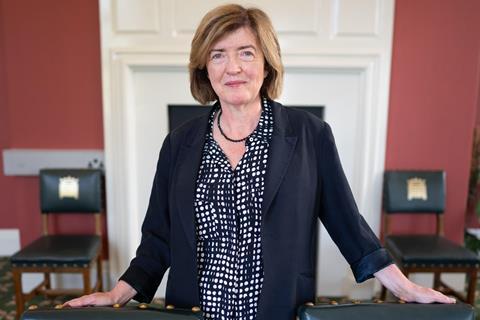Whether the Prime Minister’s Chief of Staff should be paid more than him is a gossipy non-story. It may be easier to binge on tales of political intrigue than face what’s going on in the world, but Christians must not get distracted from the real work of politics, says Tim Farron

‘Starmer’s top aide paid more than the PM’, said one BBC headline this week, referring to Sue Gray, Keir Starmer’s Downing Street chief of staff, who is paid £3,000 a year more than the prime minister.
Behind the headlines that this recent revelation is generating, there is a genuine conversation to be had about this issue. Is it right that Ms Gray sits on the Whitehall committee responsible for deciding the pay of civil servants and special advisors when she was a civil servant herself until her recent move to Labour’s top team?
It is far easier to hear reports of rows in Downing Street than the hard reality of the world
While serving as the head of propriety and ethics in the Cabinet Office, Gray also famously authored the report on Covid-19 rule breaking in Downing Street under Boris Johnson.
Transparency on pay and promotion is important, and the media will work itself into a frenzy at the slightest whiff of hypocrisy - especially those who are most resentful of Labour’s election victory.
Hungry for power
Much of this story is based around quotes from anonymous, supposed insiders. Much of it is also pretty vicious and personal in tone. Who knows if these accusations are true? Often, they will be fuelled by bitterness rather than any desire to see fairness. But sadly, none of that seems to matter in the machinations of the rumour mill.
This gossipy, whispering approach to politics is precisely what turns many people away from it. While some in Westminster revel in it, the truth is that gossip - whether in the corridors, voting lobbies or bars - only serves to tarnish the public’s perception of politics.
Conference season is especially bad for this. Late nights in the conference bars inevitably lead to rumours of bad behaviour but often fuel dishonest character assassination. People with bruised egos and suffering from acute bouts of jealousy will complain about missing out on top jobs.
Distracted by gossip
It seems that status is the real currency here – far more than even money or power. “Vanity of vanities!” says Ecclesiastes 1:2 (ESV). We may be talking about a different kind of vanity here but, nevertheless, it does seem that vanity, ego and the quest for status is at the very heart of politics and, indeed, of political journalism.
It fills the 24-hour news cycle with easy, vague stories that don’t require hard evidence. This is often a distraction. It is far easier to hear reports of rows in Downing Street, of affairs in Parliament or of personal failings than it is to hear about the hard reality of the world outside, where huge problems that affect our lives remain unsolved.
At home, the NHS is in a deep level of crisis at almost every level. We have thousands of children currently not attending school or receiving decent education at home.
Overseas, starvation and violence is growing to horrifying proportions in the Sudan. And we see the ongoing suffering in Ukraine, Israel and Palestine. So much of what is happening in the world is deeply troubling and hard to get our heads around. It seems easier to binge on stories of political intrigue and gossip.
Standing for better
Westminster is an especially gossipy workplace, with its long hours, media pressure and high stakes decisions. But it’s not the only workplace where gossip can be like an almost permanent poison – there are so many other places full of people following the very human desire to bad mouth those they don’t like and spread unsavoury rumours as facts.
So much of what is happening in the world is deeply troubling. It’s easier to binge on stories of political intrigue and gossip
As Christians, we are commanded not to spread slander. We heed the scripture in James 1:26, which warns that our “religion is worthless” if we “do not keep a tight rein” on our tongues. If we are expected to uphold these standards in our personal lives, why should our approach to political engagement be any different?
So, we must not bear false witness but, at the same time, we have the responsibility to check out the veracity of what we have heard or read, because we are no less culpable before God if we spread second hand lies than if we had invented them ourselves.






































